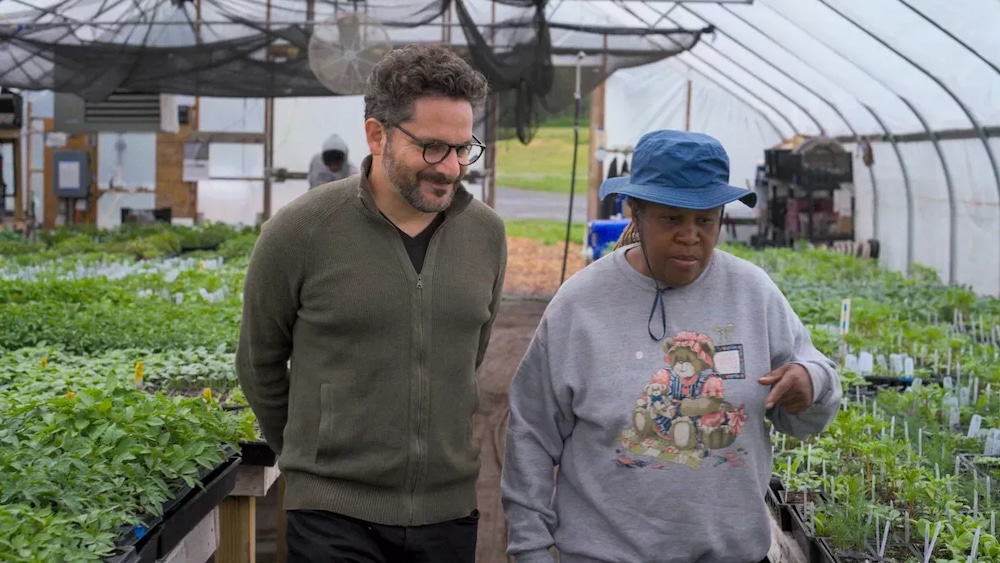This post was originally published on Eco Watch
The PBS documentary series A Brief History of the Future was an idea whose germination accelerated during the COVID-19 pandemic.
“Right around the time that the pandemic was hitting us, I realized that most of the narratives and stories about the future were based in doom and gloom, right?” said Ari Wallach, co-executive producer and host. “I call it big dystopia.”
Ari Wallach talks with Karen Washington, a farmer in Chester, New York. BetterTomorrows
Wallach is a futurist who has been investigating our planet for years, trying to determine “what does a flourishing society look like on a thriving ecologically-sound planet Earth.” One way to explore this idea was to travel with a film crew and document positive impacts around the globe. Wallach and his team visit a kelp farmer in New Haven, a solar farm in Morocco, a mycelium entrepreneur in New York state and a floating village in Amsterdam, among many other locations. The footage was molded into a six-part, six-hour documentary. The series, which covers not only climate innovators but historians, scientists and thinkers, premieres on PBS on April 3, and Wallach was part of a team that included executive producer Catherine Murdoch (married to James Murdoch, Rupert Murdoch’s son), the UNTOLD studio, and Drake’s DreamCrew production team. The following are excerpts of a conversation with Wallach from his home in Hastings-on-Hudson.
You’re sort of looking at this show as a kind of corrective to the doomsday-based climate narratives out there?
It is a corrective intervention on how we think about the future, which is – yes, there are potentially a lot of bad things that can happen. But guess what? There’s also a lot of potentially great things that can happen. What I say early on in this show is, we often think about what could go wrong, but we don’t often think about what does it look like if it goes right. And there’s multiple rights.
Were there places from your travels that stuck out for you?
It was my first time in Iceland and the folks that I met were very forward thinking. They’re like, here’s what we have. And here’s how we’re going to make it better. We’re going to tap into geothermal. We’re going to grow food in the middle of winter. We don’t have a lot of light. So, we’re going to store light. Parallel to that, when we were in India, we were in this very small village that had decided to go almost completely solar. This was much more of like, here’s how we lean into better futures environmentally, sustainably and for our own health. And that mindset was very different from the one that I’ve been kind of enmeshed in for the past decade plus, especially in the kind of clean green energy space.
When you see these micro examples of people doing things at the very local level, how did that change how you think about things, or did it at all?
A lot of what I did as a kind of host and a guide was pull myself out of the usual rooms that I’m in. I’m in a lot of conference rooms and a lot of organizations… Seeing folks who were acknowledging where they were and where we are as a species on this planet right now, but then saying, okay, let’s acknowledge, but let’s move forward, and move forward in a way that is not pollyannish rainbows and unicorns, but move forward in a way where it’s like, every little bit counts.
You know, I go back to this quote that I always attribute to Al Gore, but I don’t know if it’s really from him. There’s no silver bullet. It’s a silver buckshot. A lot of what we did in our travels was finding the people who are doing the silver buckshot.
When you visited Ecovative (a company producing food, leathers, and materials from mycelium, a fungi) how scalable do you think something like that is and how optimistic does that make you feel about where we can go with food production?
Let’s go back a hundred-ish years to the first couple of oil derricks in Tulsa or the Permian Basin. And now look at the global footprint of oil and big oil. No one back then thought it would scale to being basically how you run a planet. Whether it’s mycelium for food production or for energy or for building materials, people say, well, how can that scale? Look around. A gas station on every corner, a car in front of every home more or less, we scaled it, it worked. And that wasn’t even driven by an emergency. That was just driven by economics. So, imagine if you have economics and a little bit of an emergency situation — that stuff can scale.
You introduce this concept of the intertidal moment – the moment between things in the ocean. But what does this mean for our species?
As a society we’re at an intertidal between what was and what will be. What the show really does is it brings to light different folks and projects and ideas that are for the intertidal moment. They are emblematic of an intertidal mindset of, we got to take a little bit about what we did before, mix it in with this kind of the chaos of the current moment and point us towards what we want. But none of them claim to be the perfect example of the next paradigm. What we show in the series are folks who are doing that with an open, innovative mindset, whether it’s in technology or food or housing or how we think about democracy or even human psychology.
Your team also visits with Boyan Slat (founder of The Ocean Cleanup). What was that like?
The takeaway from Boyan Slat isn’t just what they’re doing, because what they’re doing is very fascinating. They’re cleaning up rivers and taking microplastics or plastic that became microplastics out of the ocean and therefore out of the fish. He basically said, everyone kept saying this is impossible. You can’t do anything. And he just kept saying, what if we just go and clean it up? He said, not everything has to be pie in the sky, Manhattan-project level. Sometimes you just have to do it.
What would you say to people who are becoming overly cynical about climate breakdown?
It’s hard not to be cynical about the fate of our species on planet Earth. We have to recognize, though, that those aren’t all the stories of what’s happening. There are two things you can do. One, curate what comes into your mind… think about the stories that are perpetuated algorithmically to us. These algorithms are receptive to what it is that we’re clicking on. So be careful and think about what you want more of coming on to your information plate. Two, there are things that you need to do in your daily life. We had a lawn, and we’re letting it go to a meadow. What does Ari’s little piece of land have to do with, you know, creating a pollinator pathway? But that helps avoid the cynicism knowing that you’re doing something. There are bigger things. You can donate to candidates. You can march. You can rally. The key thing, though, is to recognize that you have agency, both for your own actions and those around you.
A Brief History of the Future premieres April 3 on PBS. Watch the trailer below.
The post New PBS Documentary Focuses on a More Hopeful Future appeared first on EcoWatch.





0 Comments